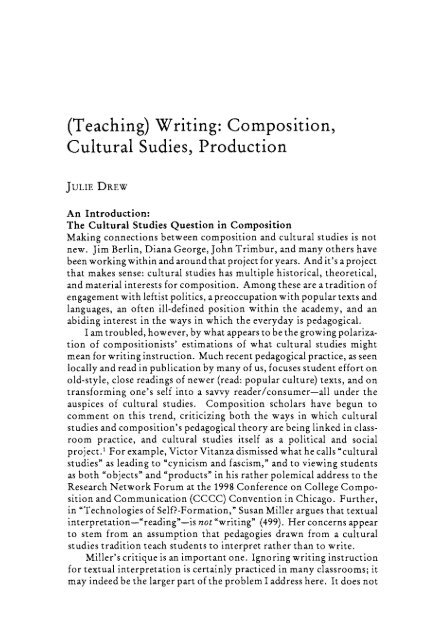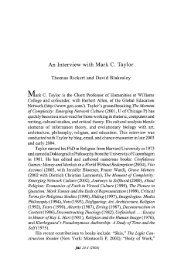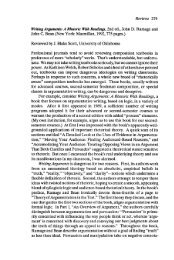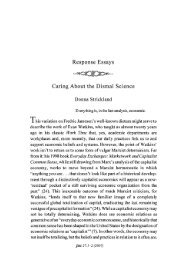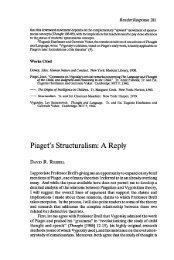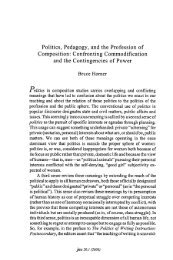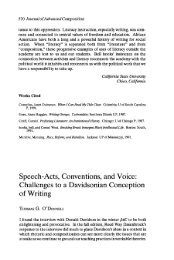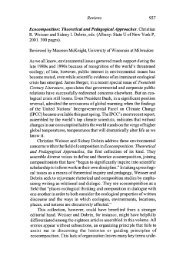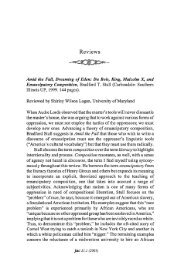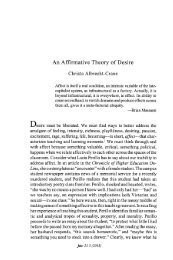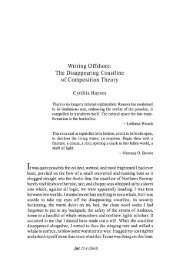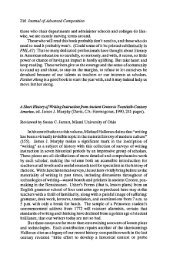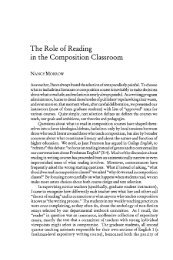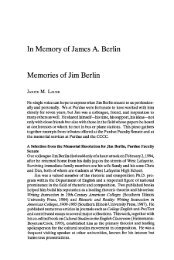(Teaching) Writing: Composition, Cultural Studies ... - JAC Online
(Teaching) Writing: Composition, Cultural Studies ... - JAC Online
(Teaching) Writing: Composition, Cultural Studies ... - JAC Online
You also want an ePaper? Increase the reach of your titles
YUMPU automatically turns print PDFs into web optimized ePapers that Google loves.
(<strong>Teaching</strong>) <strong>Writing</strong>: <strong>Composition</strong>,<br />
<strong>Cultural</strong> Sudies, Production<br />
JULIE DREW<br />
An Introduction:<br />
The <strong>Cultural</strong> <strong>Studies</strong> Question in <strong>Composition</strong><br />
Making connections between composition and cultural studies is not<br />
new. Jim Berlin, Diana George, John Trimbur, and many others have<br />
been working within and around that project for years. And it's a project<br />
that makes sense: cultural studies has multiple historical, theoretical,<br />
and material interests for composition. Among these are a tradition of<br />
engagement with leftist politics, a preoccupation with popular texts and<br />
languages, an often ill-defined position within the academy, and an<br />
abiding interest in the ways in which the everyday is pedagogical.<br />
I am troubled, however, by what appears to be the growing polarization<br />
of compositionists' estimations of what cultural studies might<br />
mean for writing instruction. Much recent pedagogical practice, as seen<br />
locally and read in publication by many of us, focuses student effort on<br />
old-style, close readings of newer (read: popular culture) texts, and on<br />
transforming one's self into a savvy reader/consumer-all under the<br />
auspices of cultural studies. <strong>Composition</strong> scholars have begun to<br />
comment on this trend, criticizing both the ways in which cultural<br />
studies and composition's pedagogical theory are being linked in classroom<br />
practice, and cultural studies itself as a political and social<br />
project.! For example, Victor Vitanza dismissed what he calls "cultural<br />
studies" as leading to "cynicism and fascism," and to viewing students<br />
as both "objects" and "products" in his rather polemical address to the<br />
Research Network Forum at the 1998 Conference on College <strong>Composition</strong><br />
and Communication (CCCe) Convention in Chicago. Further,<br />
in "Technologies of Self?-F ormation," Susan Miller argues that textual<br />
interpretation-"reading" -is not "writing" (499). Her concerns appear<br />
to stem from an assumption that pedagogies drawn from a cultural<br />
studies tradition teach students to interpret rather than to write.<br />
Miller's critique is an important one. Ignoring writing instruction<br />
for textual interpretation is certainly practiced in many classrooms; it<br />
may indeed be the larger part of the problem I address here. It does not
412 lAC<br />
follow, however, that asking students to interpret rather than to write<br />
is an inevitable function of integrating cultural studies with composition.<br />
We fail students both when we incorporate into our pedagogical<br />
practices those aspects of cultural studies that do not further<br />
composition's particular disciplinary goals, and when we react to such<br />
ineffective practices by dismissing cultural studies entirely.<br />
Conversations about composition and cultural studies appear to be<br />
shaping up like this: emerging pedagogical methods in composition, as<br />
reflected in many scholarly articles, monographs and textbooks, and<br />
conference presentations focus, often exclusively, on the importation of<br />
popular culture texts for analysis by students. 2 Some scholars are<br />
beginning to question the soundness of such practices for writing<br />
instruction and, further, to question the usefulness of cultural studies<br />
for composition. J Both positions limit what we might offer students in<br />
writing classrooms. I hope in this article to offer an alternative take on<br />
the use-value of cultural studies for composition, a take that acknowledges<br />
both the benefit of analysis and interpretation from a cultural<br />
studies model, and the critique of close textual readings for writing<br />
instruction. I believe the way to accomplish this is to rethink process<br />
through cultural studies-specifically, to expand our notions of process<br />
to include particular hermeneutic practices. It is an attempt, really, to<br />
locate a more material connection between cultural studies and actual<br />
writing instruction.<br />
I am not interested in asking whether some enterprise called "cultural<br />
studies" should be embraced or rejected by compositionists; that<br />
question is rather vague and the time to ask it, even in a more subtle form,<br />
has passed. We are already there. We might ask instead how composition<br />
classroom practices are (already) infused with particular aspects of<br />
cultural studies, how well those practices are meeting the needs of<br />
students and the discipline of writing, and how we might work collectively<br />
to improve them. Despite the pervasiveness of popular culture<br />
texts in composition classrooms, what may be most useful for those who<br />
theorize and teach writing is cultural studies' unwavering insistence<br />
that analysis of the conditions in which discourse is produced contributes<br />
significantly to the possibility of producing effective, interventionist<br />
discourse.<br />
Constructing a cultural studies/reading versus composition/writing<br />
binary is, quite simply, counterproductive. It is also avoidable.<br />
Declaiming for composition instruction and against cultural studies<br />
may be intended as a blow in the fight for teaching that is both performed<br />
and taken seriously, but it also serves to ignore the pedagogical val ue of<br />
cultural studies' interest in the social conditions of textual production.<br />
Because, while textual analysis of the traditional literary sort certainly<br />
is a part of some cultural studies work, suggesting that cultural studies
<strong>Composition</strong>, <strong>Cultural</strong> <strong>Studies</strong>, Production 413<br />
is textual analysis does nothing more radical than re-insist that the acts<br />
of reading and interpreting literature do not make students better<br />
writers. It does even less to address the cultural studies question in<br />
composition.<br />
<strong>Cultural</strong> <strong>Studies</strong> and Textual Production:<br />
Making Connections<br />
The term cultural studies is, from the outset, highly contested: contested<br />
in name, contested in practice, contested in politics. Stuart Hall and<br />
others have reminded us repeatedly that cultural studies is not and has<br />
never been one thing, but has rather continued to adapt to its historical<br />
and geographical locations in and through various, interdisciplinary<br />
practices. It may be safe to say, however, that cultural studies has been<br />
preoccupied with certain general questions and methods; that it does,<br />
in fact, have both practical and theoretical traditions. Cary Nelson, who<br />
identifies some of those traditions, argues that cultural studies is<br />
primarily concerned with how "all cultural production is sustained and<br />
determined by (and in turn influences) the broad terrain of popular<br />
common sense," and with the "struggles over meaning that reshape and<br />
define the terrain of culture. It is devoted, among other things, to<br />
studying the politics of signification" as well as the "production,<br />
reception, and varied use of texts" ("Always" 31, 32). It is the "politics<br />
of signification," and the "production ... of texts" that I want to focus<br />
on here. Others have already offered exhaustive and detailed accounts<br />
of the ever-expanding histories and projects of cultural studies; I am<br />
primarily concerned with the pronounced interest in the conditions of<br />
production exhibited in much cultural studies work, and how those<br />
interests might best inform composition pedagogy. 4 Those who utilize<br />
a cultural studies method in examining cultural practices attempt to<br />
discover how social relations, cultural meaning, and identities are<br />
discursively produced. For writing theory, then, cultural studies analyses<br />
may discover how readers receive texts and what effects texts have<br />
on social relations and identity formation. But more than that, textual<br />
analyses conceived from a cultural studies tradition may ~lso identify<br />
who writes particulartexts, and what conditions (economic, geographic,<br />
linguistic, political, technological, social, and so on) are in play to<br />
construct those individuals as authors, and those texts as more or less<br />
significant. This is why suggesting that cultural studies analysis is<br />
merely close textual reading fails to enhance either our understanding<br />
of cultural studies' significance for writing, or our teaching practices.<br />
Textual analysis can hardly be defined as one practice or set of<br />
practices; English studies has a complex tradition of textual analysis<br />
that is substantially different-although it may be a part of-a cultural<br />
studies analysis of text. Hall points out that in order to conduct a
414 <strong>JAC</strong><br />
cultural studies analysis, "you have to work on the text, but you also<br />
have to work on the context; you have to know something about the<br />
history of the society in which the institutions work, as well as about<br />
what the technologies of the media are and how they're financed."<br />
Language is, he notes, "discursive from beginning to end. But," Hall<br />
insists, "it's also something else: it's also materialist, economic, political,<br />
social, technological. It's not only textual because it is textual"<br />
(Drew 184).<br />
The differences between traditional literary analysis and cultural<br />
studies analysis, and the difficulties inherent in attempting to simply<br />
appropriate a cultural studies tag for work that is decidedly literary are<br />
further noted by Nelson's insistence that<br />
a scholarly discipline, like literature, cannot begin to do cultural studies<br />
simply by expanding its dominion to encompass specific cultural forms<br />
(western novels, say, or TV sitcoms, or rock and roll), social groups (working<br />
class youth, for example, or communities "on the margins," or women's<br />
rugby teams), practices (wilding, quilting, hacking), or periods (contemporary<br />
culture, for example, as opposed to historical work). <strong>Cultural</strong> studies<br />
involves how and why such work is done, not just its content. ("Introduction"<br />
11)<br />
According to Simon During, one of the purposes of such interpretation<br />
and analysis in cultural studies is to produce "liberating effects" -at<br />
best an ambiguous phrase, and thus seemingly meaningless for pedagogical<br />
application ("Introduction" 25). A potentially liberating effect<br />
of this type of analysis, however, can be located when that analysis is<br />
contextualized in a composition classroom and presented as part of the<br />
process of producing effective texts. Asking students to identify the<br />
conditions under which they produce texts, and to then use that knowledge<br />
in their rhetorical choices, may go a long way toward enabling<br />
students to both write academically successful texts, and to discursively<br />
intervene in social and political practices that they might wish to<br />
subvert. We are all familiar with students who labor, often with neither<br />
hope nor success, under the illusion that effective writing in any context<br />
is produced by talented writers, and the writing is effective precisely<br />
because of talent, because of some innate ability. Liberating students<br />
from that notion by educating them to both the theoretical concept of<br />
writing-within-competing-social-forces, and helping them to explicate<br />
the particular social forces within which they write, is one way to<br />
directly address the concerns of those who would teach writing as a<br />
democratic project.<br />
<strong>Writing</strong> is a social act, and the success of particular rhetorical<br />
choices is, at least in part, relative to the consideration the writer takes<br />
of the context(s) of the writing s/he intends to produce. And, it is<br />
important to understand that the success of students' rhetorical choices
<strong>Composition</strong>, <strong>Cultural</strong> <strong>Studies</strong>, Production 415<br />
may depend on both their skill in "manipulating genres" and in their<br />
"savvy about stylishness" (Miller "Technologies" 499). The context of<br />
producing effective written discourse is larger and more complex than<br />
a traditional construction of audience in composition pedagogy. <strong>Cultural</strong><br />
studies theories and methods support contemporary composition<br />
theory in claiming that other forces besides a writer-subject and an<br />
identifiable audience are at work in the production of authors and texts.<br />
Competing social forces-forces that favor some and disadvantage<br />
others-certainly exist in institutional classroom settings where students<br />
labor to write essays, just as surely as in settings that produce<br />
popular culture texts such as films, romance novels, and rap music.<br />
Analyzing the cultural forces that intersect at the moment of student<br />
writing need not take the place of more traditional writing instruction.<br />
Such analyses, however, when coupled with writing instruction, might<br />
better enable students to develop the ability to actively and successfully<br />
engage, rather than passively interpret, their worlds.<br />
Articulation and the <strong>Cultural</strong> <strong>Studies</strong> Circuit<br />
Hall insists that for an analysis to be a cultural studies project it must<br />
identify and examine the complexities of what he calls the "cultural<br />
studies circuit." A cultural studies circuit useful to composition theory<br />
and practice would consist of intersections of social forces from which<br />
discursive texts are produced. An analysis of such a circuit would, if we<br />
accept Hall's account, allow not only for understanding how configurations<br />
of power are (re)produced, but also for political intervention, a<br />
point that is crucial for contemporary composition pedagogy. Comprehending<br />
that the conjunctures of historical and material forces playa<br />
significant role in the production of both authors and texts might enable<br />
students to identify and examine the various forces at work in their own<br />
attempts to author texts.<br />
It is not just writing, then, or reading, or even a combination of the<br />
two that would constitute a cultural studies approach to writing instruction.<br />
A cultural studies approach to writing instruction would also<br />
necessarily include acknowledgment and analysis of the circuit of<br />
communication that defines the moment of students writing-and of<br />
students' writing. Such a circuit might include production (the nature<br />
of institutional writing); circulation (audience: peers, the instructor);<br />
consumption (how this text will be used: grades, degree requirements,<br />
literacy standards and their economic ramifications); and reproduction<br />
(the institutional practices, and hence larger social relations, that are<br />
supported by such writing) (Hall "Encoding").<br />
One way to better understand a notion of the cultural studies<br />
circuit, and how such a concept might benefit student writers, is to<br />
follow John Trimbur's, Patricia Harkin's and others' lead in deliber-
416 lAC<br />
ately locating the term "articulation" within textual production, and<br />
thus within composition pedagogy. Articulation is, as Patricia Harkin<br />
notes, "both a saying and a connecting. It describes an enactment of<br />
meaning, while simultaneously connecting that meaning to multiple<br />
discursive systems" (494). Articulation, then, as it pertains to cultural<br />
studies' understanding of a circuit of communication, of simultaneously<br />
saying and connecting, enunciating and engaging, may be used to<br />
describe what happens when students produce texts in an academic<br />
setting. In other words, what compositionists have called process may<br />
be expanded to include not only students' invention, drafting, and<br />
revising practices, but also the practice of analyzing the cultural forces<br />
that are necessarily constitutive of the academic texts they will produce.<br />
Student-writing itself may then be viewed as an "enactment of<br />
meaning" but also, simultaneously, as a material connection among<br />
various forces at work in the moment of student authorship. When<br />
students write, they do so out of particular conjunctures of social and<br />
material forces, indicated by their very presence in the college classroom;<br />
they are also subsequently evaluated by instructors whose normalizing<br />
presence and judgement help students learn to enunciate-to<br />
write-in ways that support particular social relations.s In this way,<br />
student writing and writing instruction are both saying and connecting,<br />
as their texts link, in the moments of both production and reception, the<br />
economic, political, social, and other forces that work to produce and<br />
reproduce cultural meaning.<br />
The position of importance within cultural studies that is given to<br />
articulation theory, as both engendering meaning and making connections<br />
between various forces at a particular historical moment, further<br />
suggests the centrality of "production" in much cultural studies work.<br />
Thus, the possible value for composition in a classroom practice that<br />
draws on articulation theory and cultural studies analysis becomes<br />
further apparent when we understand two things. First, that in addition<br />
to its perhaps more easily visible work in reading and interpreting<br />
popular culture texts, cultural studies is deeply committed to developing<br />
both theoretical and practical explorations of the conditions of<br />
production and the ways in which social forces help to construct<br />
identities and other cultural meaning. And second, that these same<br />
concerns have been central to the theoretical and pedagogical work in<br />
composition for over three decades: the moment the field turned from<br />
product to process was the moment cultural studies had something to<br />
say to writing theorists and teachers.<br />
As Trimbur notes, cultural studies' "project is to produce useful<br />
know ledge by linking critique to political causes and movements," and<br />
it is just this sort of link, this articulation, that opens up a dialogue<br />
between cultural studies and composition (10). <strong>Composition</strong> is, and
<strong>Composition</strong>, <strong>Cultural</strong> <strong>Studies</strong>, Production 417<br />
always has been, a political cause-in fact, an ever-changing site of<br />
conflicting political causes. At the center of our work in composition<br />
is the project of "helping adult learners achieve the kind and level of<br />
literacy that will allow them to participate effectively in the discourse<br />
of educated people, both within the academy and in the broader arena<br />
of public discourse. Our discipline is ... about adult literacy" (Schwalm).<br />
Pedagogies that include helping students understand how to identify<br />
the conditions of textual production-and why this might aid them<br />
in producing powerful texts-might enable them to work within and<br />
around the constraints embodied in those conditions in order to achieve<br />
particular aims. Such an articulation of composition and cultural<br />
studies might include a conviction that analyses of the conditions of<br />
textual production enable those who aspire to authorship that subverts<br />
particular social relations and supports or creates others to do so more<br />
effectively. The problem lies, not in attempting to form connections<br />
between cultural studies and composition, but in doing so hastily,<br />
carelessly, and ineffectively. Susan Miller's worry about writing instruction<br />
based on asking students to reflect is a valid concern. Our<br />
publications and conference presentations indicate that many composition<br />
instructors are becoming increasingly interested in the objects of<br />
cultural studies analysis as texts for students to read and interpret; this<br />
trend may, as Miller implies, indicate a decrease in actual writing<br />
instruction. 6 Instead of looking to cultural studies for texts to analyze,<br />
we might attempt to help students conduct and incorporate analyses of<br />
the conditions in which they themselves produce cultural meaningacademic<br />
texts-as an integral part of their writing process. Such a<br />
practice might better enable them to produce those texts competently<br />
and, not coincidentally, give them the skills to assess other, extraacademic<br />
sites of textual production in which they might participate in<br />
engaged and powerful ways.<br />
<strong>Cultural</strong> studies is not the culprit in the kinds of ineffective pedagogical<br />
practices that ask students to read and interpret, merely substituting<br />
popular texts for more traditional literary texts. The reasons for<br />
such practices are twofold. First, composition's interdisciplinary<br />
nature and burgeoning body of literature limits the degree to which we<br />
can achieve subject-mastery. Consequently, many of us proceed with<br />
only a partial knowledge, at best, of the depth and breadth of the theories<br />
and methodologies that constitute the enormous body of work called<br />
"cultural studies," even while we often claim to be "doing" cultural<br />
studies'! Second, that work in cultural studies that analyzes texts is<br />
immediately familiar to those trained in, and comfortable with, literary<br />
textual interpretation. The practice of textual interpretation is thus<br />
often (and incorrectly) declared to be cultural studies rather than one<br />
aspect of some cultural studies-an important distinction.
418 <strong>JAC</strong><br />
This misrecognition and subsequent misnaming leads not only to<br />
ineffective writing instruction, but also to an understandable reaction<br />
to such practices that "cultural studies" has little of value to offer<br />
writing instruction. What cultural studies has to offer composition<br />
pedagogy is not reading instead of writing, interpretive skills instead of<br />
rhetorical skills, political passivity instead of engagement. 8 Rather,<br />
particular aspects of cultural studies offer a way, both theoretically and<br />
methodologically, for students to locate themselves within the complex<br />
and changing social structures that variously encourage or inhibit<br />
particular individuals in academic and social writing, and thus from<br />
effective, discursive participation and intervention. Students should be<br />
invited to view their instructor's pedagogical discourse, the essays and<br />
organizational frameworks of their handbooks, readers and other texts,<br />
and the writing that they themselves and their peers produce as sanctioned<br />
by particular sets of conditions. The degree to which a text exists<br />
as such and is deemed effective is directly linked to the historical and<br />
material conditions in which writers write and readers read. It is in the<br />
articulation of analyses of the conditions in which writing is produced,<br />
and in which writing is received, that may serve to expand our own and<br />
students' understanding of how texts are effective.<br />
<strong>Cultural</strong> studies' tradition of textual and cultural analysis may<br />
benefit students enormously if that analysis is part of a writing process<br />
and thus firmly embedded in writing instruction. The pedagogical value<br />
for students in a first-year composition course of analyzing a text,<br />
whether it is a comic book, popular music lyric, or canonized work of<br />
literature, as a means to improve their writing is dubious. I refer, rather,<br />
to analyses of the context of the writing students are asked to produce.<br />
Asking students to analyze relevant cultural (con)texts and social relations<br />
as a part of their writing process may help them to understand the<br />
ways in which who counts as a writer and why, and which writing counts<br />
as effective are in fact determining subtexts of powerful, interventionist<br />
writing.<br />
Reading (broadly conceived), interpretation, and analysis-all part<br />
of a cultural studies' tradition-may be included in a reinvigorated<br />
notion of process within composition without replacing writing. I share<br />
Miller's concern that this is too often the case. I do not, however, believe<br />
that such practices are inevitable when we include analytical and<br />
interpretive practices in writing instruction. Rather, writing instructors<br />
might put analysis in the service of actual writing practice within<br />
the classroom, as part of students' writing process. In order to do so,<br />
writing as such, and the conditions that make writing possible, must be<br />
the focus of analysis. Assuming that any classroom practice informed<br />
by a cultural studies methodology must neglect, perhaps abandon<br />
altogether, actual writing instruction is an understandable reaction to
<strong>Composition</strong>, <strong>Cultural</strong> <strong>Studies</strong>, Production 419<br />
some of the classroom practices we observe in our departments or that<br />
are described in conference presentations and scholarly publications.<br />
But that assumption also serves to shut down any possibility of imagining<br />
an alternative construction of the relationship between composition<br />
and cultural studies.<br />
Disciplinarity and <strong>Teaching</strong><br />
<strong>Composition</strong>'s disciplinary identity is central to this discussion of how<br />
compositionists incorporate cultural studies theories and practices into<br />
their classrooms, how effective those incorporations might be, and how<br />
they might be constructed in more useful ways. Whenever we ask,<br />
"What should we be doing in composition?" and "How should we be<br />
doing it?" we are asking questions about disciplinarity as well as<br />
methodology.9 <strong>Composition</strong> is identifiable as an academic discipline<br />
in part because the various practices employed by compositionists are<br />
different than those employed in other disciplines. In other words, as<br />
Stanley Fish has argued, '''what we do here' is differential; it comes into<br />
view against a background of the practices it is not; and it must 'show'<br />
in that way-as something we, not others, do-because if it did not it<br />
could not sustain a challenge to its usefulness" (16). Further, it is "a<br />
requirement for the respectability of an enterprise that it be, or at least<br />
be able to present itself as, distinctive" (17).<br />
The notion of composition's disciplinary distinctiveness may be a<br />
key factor in determining if and how cultural studies theories and<br />
methods are useful to composition. Such a notion entails regarding<br />
composition as both a distinct field of inquiry and instruction, and as<br />
a cultural practice. I discuss elsewhere in this essay the harmful effects<br />
for students of writing instruction that merely apes the work of cultural<br />
studies in analyzing popular culture without careful theoretical and<br />
practical consideration of what such instruction means for writing.<br />
<strong>Composition</strong> as a discipline is equally damaged by the hasty and careless<br />
adoption of the arguably prestigious mantel of cultural studies. Some<br />
of the work done in cultural studies does indeed offer in-depth interpretations<br />
of popular culture texts. But appropriating those texts for<br />
similar kinds of interpretation and analysis by students in first-year<br />
writing classes, regardless of the relevance of that project to aims that<br />
are unique to composition, reduces the possibility of effectively defending<br />
our work to those who challenge both our pedagogical practices and<br />
our scholarship.<br />
By claiming that we are "doing cultural studies" in our classrooms,<br />
we run the risk of being heard to say that we are not "doing composition."<br />
The conservative push in recent years-often from within our<br />
own English departments-for composition to get back to basics and just<br />
teach writing skills should indicate that being understood to say we are
420 lAC<br />
no longer teaching writing is no small matter, however inaccurate such<br />
an understanding might be. One may argue, of course, that allowing<br />
conservative critics to define the terms of the discussion merely reinforces<br />
conservative agendas for literacy and education in general. And<br />
yet, if we will turn to cultural studies for theoretical and methodological<br />
input, are we not obliged to make a clear and persuasive case, at least<br />
to ourselves, that incorporating some aspect of cultural studies into<br />
writing instruction benefits students in clearly defined ways?10 And<br />
wouldn't such a case be more likely to survive the onslaught of more<br />
conservative counter-arguments?<br />
The "clearly defined ways" in which students benefit from our pedagogical<br />
practices should speak to the distinctiveness of composition as a<br />
field of inquiry and instruction. Presumably, few would argue against the<br />
articulated aims of what is often called liberatory learning for students. An<br />
argument for a relationship among cultural studies and composition, however,<br />
based solely on the perceived commonality of left political interests<br />
and such concepts as critical consciousness, democratic participation, and<br />
pedagogy as politics and the inflated claims that often accompany such<br />
language are simply not good enough. Neither is a tradition of textual<br />
analysis. They are good places to start, reasons to further research the<br />
possibilities of cultural studies' usefulness to composition, but they hardly<br />
offer compelling evidence that the unique aims of composition instruction<br />
are furthered by an adoption of cultural studies methods.<br />
A persuasive argument for the inclusion of some aspect(s) of cultural<br />
studies would, however, address the ways in which the disciplinary<br />
aims that are distinctive to composition, including and especially<br />
students' particular needs, are enhanced by the relationship. In other<br />
words, in addition to simply describing our cultural studies/composition<br />
classroom practices, we must also discuss their theoretical rationales,<br />
and their results as they pertain to students' abilities to "write<br />
powerfully" and to effectively "manipulate genres" (Miller "Technologies"<br />
499). Otherwise, students' classroom experiences are less effective<br />
because ad hoc pedagogical practices are foisted upon them with<br />
little or no connection to actual writing. Further, the field of composition<br />
is less likely to overcome either the conservative backlash against<br />
contemporary pedagogical theories and practices, or the perception of<br />
those in our own academic communities that composition is merely a<br />
service component of real education. That perception often has very<br />
real effects on our work and on our professional advancement. In short,<br />
composition that does not devote careful and extensive thought to the<br />
theoretical and practical foundations of its pedagogical practices may<br />
be perceived by students, conservative critics, and colleagues-and<br />
rightly so-as no longer that discipline, but some other. Carefully<br />
considered incorporations of certain aspects of cultural studies may
<strong>Composition</strong>, <strong>Cultural</strong> <strong>Studies</strong>, Production 421<br />
indeed benefit writing instruction (I argue that they can), but in order<br />
to make that determination we must work through the relationship with<br />
an eye to composition's disciplinary distinctiveness.<br />
Relying on the easy but problematic term cultural studies leaves a<br />
great deal of space for slapping classroom practices together and calling<br />
them cultural studies with little or no theoretical rationale. The<br />
cultural capital currently afforded any academic endeavor associated<br />
with cultural studies is exceedingly high, making the tag even more<br />
attractive to theorists and practitioners alike. ll But composition is illserved<br />
by constructing pedagogical practices that rely on traditional<br />
literary analysis and calling those practices "cultural studies." Because<br />
English departments continue to address the role of reading in writing<br />
instruction, any theory or practice associated with cultural studies may<br />
be saddled with compositionists' critique of the failure of interpretation<br />
to intervene in the world. In this case, that debate overlaps/<br />
intersects with debates about how to teach students to be better rhetoricians,<br />
better writers. And intervening in the world, from the work of<br />
Paulo Freire to Mina Shaughnessy to Min-Zhan Lu, and scores of others,<br />
plays a significant role in teaching and in writing. The question is, What<br />
political impacts are associated with particular classroom practices?<br />
Many in the field assume for composition a more radically political<br />
role in culture than the role played by literary interpretation. For<br />
example, in an on-line discussion of the radical possibilities of textual<br />
interpretation, Raul Sanchez writes, "I'm always puzzled at the implicit<br />
and explicit faith some seem to have in the power of hermeneutics, as<br />
if celebration or even proper postcolonial 'interrogation' of literary<br />
texts could represent anything remotely like radical political action."<br />
Sanchez goes on to say that he prefers the "more humble," but perhaps<br />
"more useful" task of teaching writing.<br />
The implication here is that writing delivers and reading fails to deliver.<br />
Such comments, however, do not identify whether teaching and writing<br />
practices, however humble, will deliver the promised political utility, or how.<br />
What kind of writing instruction is likely to support intervention and "radical<br />
political action?" University writing instruction? State-funded curricula?<br />
Considering the range of possibly radical political acts, reading and writing<br />
are both potentially locatable there, even if they are often neither the best,<br />
nor the worst, nor mutually exclusive. To declare that teaching writing is<br />
more a "radical political act" than teaching reading seems unnecessarily<br />
agonistic, and oddly disingenuous when one considers the ways in which<br />
reading (assessment) in composition is often far more overtly and powerfully<br />
political than writing. Bruce Horner reminds us that "[m]uch that has<br />
been accomplished in composition has come from the practice of paying<br />
close attention to student writing; indeed, composition distinguishes itself<br />
from other fields by its attention to student writing, so defined" (523).
422 lAC<br />
It is the connection, then, between that cultural studies theory and<br />
methodology which seeks to understand the conditions of textual and<br />
authorial production of cultural meaning and identity for the purposes<br />
of social intervention that makes sense for composition. And it makes<br />
sense for composition because it furthers the work of theorists and<br />
practitioners of rhetoric and writing and, more importantly, because it<br />
furthers the aims of students in writing classes. We can talk about<br />
liberatory education and still avoid the temptation to "manage students'<br />
interiors" with imperatives to reflect and offerings of preferred readings.<br />
We can, instead, focus on how to provide for students the analytical<br />
and rhetorical tools with which they might succeed in the writing<br />
they must produce for us, and also succeed in situating themselves as<br />
authors outside of sites of academic writing. <strong>Composition</strong> can, as one<br />
of its unique disciplinary characteristics, offer students the theoretical<br />
and practical knowledge to attempt authorship and to succeed in that<br />
attempt, both within and outside of a classroom setting. What is<br />
distinctive about composition is served by a cultural studies approach<br />
to textual production.<br />
Rethinking Process through <strong>Cultural</strong> <strong>Studies</strong><br />
Despite composition'S difficult transition from product to process, and<br />
the competing theories that emerged in that movement, it did at last<br />
appear fairly obvious, as Victor Villanueva notes, that writing is a<br />
process, that "texts don't appear magically on pages as whole products.<br />
There is a process in getting from mind to page" (1). Such processes,<br />
social construction theory tells us, involve more than just a direct link<br />
from autonomous mind to page, however. There are social forces at<br />
work both inside and outside of the author-subject. Those forces, or<br />
conditions, have material effects on not only the text itself, but on<br />
whether and to what extent those authors and texts are effective. 12<br />
Both the writing subject and the text itself are situated, constructed,<br />
political, historical. 1l Instructors might ask students, then, to identify<br />
and analyze both the conditions that surround the production of similar<br />
texts deemed powerful and effective, and the conditions that surround<br />
the current task of writing. Such an activity might best be structured as<br />
an integral component of the writing process itself, essential in enabling<br />
student writers to make better choices as they proceed with the act of<br />
writing. In other words, traditional notions of process might be expanded<br />
to include contextual analysis-contextual in a much broader<br />
and more complex notion than familiar imperatives to "know one's<br />
audience. "14 If working to understand how texts are produced and what<br />
forces are at work in the production of both authors and their texts is<br />
constructed as part of students' writing processes, students may benefit<br />
in multiple ways. Such analyses, coupled with writing instruction and
<strong>Composition</strong>, <strong>Cultural</strong> <strong>Studies</strong>, Production 423<br />
extensive practice, may not only circumvent those conditions that serve<br />
as barriers to their ability to construct themselves as writers, but may<br />
result in more powerful writing as well.<br />
Traditional process-based writing pedagogies often rely on an illdefined<br />
"audience analysis" for contextualizing writing; contemporary,<br />
so-called cultural studies-based pedagogies often rely on a substitution<br />
of popular culture texts for literature. There are serious problems<br />
for students in both of these approaches. Classroom practices that<br />
do not include any real analysis of the conditions that produce writing<br />
that gets read and that intervenes fail to offer students a crucially<br />
important tool for understanding and negotiating textual production.<br />
Within the traditions of British cultural studies-specifically, an insistence<br />
on contextual, cultural analysis as a part of a politicized textual<br />
production-are a ground on which we may build a more useful concept<br />
of process for students writing in our classrooms. A carefully theorized<br />
and enacted pedagogy that attempts to draw from a cultural studies<br />
tradition might view writing and the production of cultural meaning as<br />
a thoroughly material and historically contextual matter, rather than<br />
simply relying on the use of films or ads as objects for close readings.<br />
And understanding writing as a production of cultural meaning makes<br />
analyses of the cultural context of writing the proper province of writing<br />
instruction.<br />
Many recent pedagogical trends, however, have led us to classroom<br />
practices that appear to be about analyzing films or ads, or about<br />
bringing students to particular political consciousness. For example,<br />
Karen Fitts's and Alan W. France's Left Margins offers a collection of<br />
essays that ostensibly create a useful theoretical and practical connection<br />
between composition and cultural studies for use in teaching<br />
writing. A few of the essays, such as Henry Giroux's "Who Writes in<br />
a <strong>Cultural</strong> <strong>Studies</strong> Class? Or, Where Is the Pedagogy?" address writing<br />
as pedagogy, and the central role of pedagogy in cultural studies (3-5).<br />
Giroux makes a similar argument that proponents of writing-across-thecurriculum<br />
have made about the pedagogical value of writing itself, but<br />
his version of this carefully constructed and well-supported argument<br />
is used to make a "case for the importance of pedagogy as a central aspect<br />
of cultural studies" (7).<br />
This may indeed be important work; it is certainly work that Giroux<br />
is often engaged in. But while it may be related, it is not central to the<br />
work that is distinctive to composition. Giroux's classroom practice as<br />
he describes it is a fine example of another discipline integrating<br />
composition theory (writing-to-learn) and practice (actual writing assignments<br />
that are collaborative in nature and that allow/require revision)<br />
into its work in order to accomplish unique, disciplinary-specific<br />
educational goals. But the act of writing is of secondary importance here
424 lAC<br />
to bringing students to critical consciousness about how they might<br />
more fully participate as democratic citizens. Giroux assigns writing<br />
as a pedagogical tool aimed at enriching students' notions of democratic<br />
process and civic participation, and at bringing students to critical<br />
consciousness through analyses of cultural texts. <strong>Writing</strong> instructors<br />
might instead engage students in analyzing the structures that constitute<br />
the sites of students' own writing (Giroux more fully explores such<br />
practices and their pedagogical value in some of his other work), as well<br />
as in intensive practice in actual writing. There is no failure in Giroux's<br />
classroom practice as outlined in this essay; rather, the problem lies in<br />
its inclusion in a text that is purportedly a guide for writing instructors<br />
attempting to develop classroom practices based on cultural studies<br />
theories and methods. Giroux's essay illustrates a classroom practice<br />
that holds writing as a means to another, quite different, end than<br />
discursive and rhetorical ability and the understanding of how the<br />
conditions of production make such ability possible.<br />
Similarly, Peter Elias Sotiriou's undergraduate textbook, Critical<br />
Thinking and Popular Culture, making its debut at the 1998 CCCC<br />
Convention, includes an introduction to argument that offers traditional<br />
definitions and models of that genre. It includes types of evidence,<br />
how to "read critically," and how journals may be helpful to<br />
student writers. But Sotiriou misses an opportunity to situate students<br />
as producers of cultural meaning and instead develops a course that has<br />
popular culture as its object of analysis and leaves the context of student<br />
writing-the conditions of production of student texts within educational<br />
institutions-unidentified and unexamined. I do find it encouraging<br />
that the contributors to Left Margins, Sotiriou and others are<br />
working in this area; unfortunately, few seem to be working from within<br />
composition, but rather from within cultural criticism or literary<br />
analysis.<br />
Classroom practices based on a theory of articulation, however,<br />
might be a productive way to advance Bruce Horner's call for a redefined<br />
process pedagogy. Articulation theory furthers our notions of a<br />
non-essential human subject without giving up entirely the possibility<br />
of agency. The human subject is not and cannot be an originary or<br />
unified self, but neither is the subject ever wholly or simply occupying<br />
her or his place reserved by social institutions and configurations of<br />
power. A pedagogy of articulation, then, would locate student-written<br />
texts at the matrix of a host of intersecting social forces that authorize<br />
students as writers and that simultaneously support, reproduce, or<br />
subvert particular social relations (a saying and a connection). A<br />
pedagogy of articulation might avoid the critique of extreme relativism<br />
by envisioning students as partial agents, never entirely occupying the<br />
subject positions made available to them by social configurations of
<strong>Composition</strong>, <strong>Cultural</strong> <strong>Studies</strong>, Production 425<br />
power. Further, through theorizing articulation for writing instruction,<br />
theorists and practitioners might avoid the equally hazardous assumption<br />
that writing in a college classroom is a space and a time outside of<br />
history, outside of economic and social forces. A pedagogy based on<br />
articulation theory and drawing on a cultural studies tradition of<br />
analysis of the conditions of production would ask students, as part of<br />
their writing process, to identify those forces that are working for and<br />
against their authorship.<br />
Students might explore forces such as their own linguistic backgrounds<br />
in relation to institutional discourse; gender differences in<br />
communication patterns; who and what may be silenced by various,<br />
competing genres that they must, nevertheless, emulate and manipulate;<br />
and the subjectivity of both peers and teachers in reading and evaluating<br />
writing. Recognition of both their authorship and the power of the<br />
conditions of that authorship would demand identification and analysis<br />
of those aspects of both the institutional process of literacy instruction<br />
and their own locations in culture that either aid or hinder their<br />
attempts to author interventionist texts. And, finally, those texts,<br />
authored by students, that have been deemed powerful and effective, or<br />
weak and unsuccessful, respectively, by the instructors and the institutional<br />
machinery that produces such evaluations and their consequences,<br />
would also be taken into account. Such analyses, coupled with intensive<br />
practice in writing, in making statements, in stylistics, and in manipulating<br />
genres, could avoid the urge to "manage students' interiors" in<br />
"composition courses that frame student writing in imperatives to<br />
reflect" (Miller "Technologies" 498).<br />
A Conclusion:<br />
Imagining <strong>Cultural</strong> <strong>Composition</strong><br />
Working toward a pedagogy of articulation is in part a recognition that<br />
student agency operates from within a complex web of social forces;<br />
further, those forces may be negotiated through both practice in writing<br />
and analyses of a cultural studies circuit in which student writing may<br />
be located. The first part of that statement is certainly not a new idea,<br />
certainly. The second part is an attempt to persuade readers of two<br />
things. First, and somewhat ironically, that exactly the kind of intensive<br />
writing instruction that Susan Miller rightly calls for may be most<br />
effective for students if coupled with interpretation and analysis drawn<br />
from a cultural studies tradition and method. And second, that such<br />
classroom practices, locally constructed to reflect the diversity of<br />
students, instructors, and institutions, may form a relationship between<br />
composition and cultural studies that is both pedagogically sound and<br />
that maintains and strengthens composition as an academic discipline,<br />
and as a cultural practice.
426 lAC<br />
And yet this is only a partial picture. This discussion might most<br />
logically and effectively continue by broaching programmatic issues.<br />
The relevance of cultural studies to composition is locatable in carefully<br />
constructed theoretical and methodological practices that focus<br />
on cultural studies' interest in the conditions of textual production. It<br />
is the overview possible in writing program administration, however,<br />
that might enable a series of possible courses that would work together<br />
to create for students a curriculum in rhetoric and writing that is at<br />
present rarely attempted. Such a program might offer courses that ask<br />
students to practice the writing skills with which they might create<br />
powerful texts. It might offer courses that present both historical and<br />
contemporary theories about how discourse works in the world. And,<br />
it might offer courses that teach students how to identify and analyze the<br />
contexts of their various authorships, and thus ccnceive the strategies<br />
with which to intervene in the world when and to what end they desire.<br />
Clearly, this is more than anyone course, whether at the first-year level<br />
or higher, could possibly aspire to. It is in a series of carefully<br />
constructed, interrelated courses in discourse theories, methods, and<br />
practice that students may best learn to read the context in which they<br />
desire to write, and proceed to produce powerful, effective writing<br />
within that context. If our efforts in composition at the university level<br />
are aimed both at improving students' writing and at helping students<br />
understand the complex social power of discourse production as a<br />
means to that end, then it is not premature to also call for programmatic<br />
changes. Changes, I hasten to add, to a greater degree and a wider<br />
application than are currently exhibited in the field by other than a very<br />
few programs. 15 The kinds of interrelated courses we could imagine<br />
might add up to a pretty fair conception of the discursive in social and<br />
political life, and simultaneously instruct students in the production of<br />
academic discourse, in whatever arena and from whatever political<br />
position they might wish.<br />
At its best, compositionists construct what they do as literacy work,<br />
and often it is just that. <strong>Cultural</strong> studies, too, attempts to provide those<br />
who are in multiple ways excluded from access to the national culture<br />
with strategies and resources for both resistance and inclusion (Hall<br />
"Legacies"). <strong>Cultural</strong> studies has at its core an insistence that the act of<br />
textual production is intimately and irrevocably linked with the cultural<br />
forces that construct social relations and institutions of power.<br />
Separating out the act of writing from the act of identifying and negotiating<br />
those forces is to participate in protecting and perpetuating<br />
national/cultural identity against those whom it excludes. 16<br />
University of Akron<br />
Akron, Ohio
<strong>Composition</strong>, <strong>Cultural</strong> <strong>Studies</strong>, Production 427<br />
Notes<br />
1 Stuart Hall notes that critiques of cultural studies are emerging from various<br />
academic fields, including rhetoric and composition: "[W]e're hearing all over that<br />
people are becoming disillusioned. We're past the point where people are<br />
mesmerized by the ascendancy of cultural studies" (Drew 183).<br />
2 See my discussion of specific examples later in this piece.<br />
; Certainly two scholars who are critical of linking cultural studies with<br />
composition do not constitute a backlash. However, at the risk of being accused<br />
of constructing a strawman for this argument, I contend that the professional and<br />
intellectual standing of both Susan Miller and Victor Vitanza suggests a greater<br />
potential for persuading others in the field than might be assumed for two less<br />
accomplished individuals.<br />
• For examples of detailed histories of British cultural studies see, for example,<br />
During, Grossberg, Hall, Nelson.<br />
S For a discussion of the ways in which undergraduate composition supports<br />
and reproduces particular social relations see, for example, Bloom and Miller<br />
" Artifact"<br />
6 Stuart Hall notes that "there is something to the criticism that a lot of what<br />
is going on is not much more than old-style practical criticism, close textual reading<br />
of a good old Leavisian kind .... The text is abstracted from its institutional context,<br />
from its historical context-that form of what I would call 'literary cultural studies'<br />
is deeply troubling" (Drew 184)<br />
7 This is not to say that British cultural studies should or could lay claim to<br />
some sort of pure and originary past that is inviolable. My point here is that the<br />
choice by some instructors to focus a writing class on reading popular culture texts<br />
is often based on an assumption that such work is, in fact, "cultural studies." The<br />
phrase "cultural studies" carries enormous cultural capital in American universities,<br />
a point I address later, and while academics can and ought to adapt various teaching<br />
methods to their purposes, careless and ill-informed adoption of complex and<br />
theoretically sound methods can be problematic.<br />
, Miller asserts that, "By teaching texts rather than their making, by teaching<br />
awareness rather than rhetoric, and by teaching the power of meanings rather than<br />
the making of statements, we inadvertently reproduce a politics that is aware but<br />
passive. . .. <strong>Writing</strong> taught as reading, that is, accomplishes political stasis"<br />
("Technologies' 499). I agree that if writing instructors teach interpretation rather<br />
than how to manipulate genres, require reading and reflection rather than practice in<br />
writing, offer preferred readings rather than demonstrations of powerful writing, we do<br />
indeed create an aware but passive student population that leads to political stasis. I<br />
do not, however, agree with the implication that reading and interpretation are<br />
oppositionally situated to effective writing instruction, and necessarily produce political<br />
passivity whereas writing instruction necessarily produces political activism.<br />
9 For discussions of how composition's disciplinary identity and methodologies are<br />
inextricably bound in historical, material conditions, see, for example, Berlin and Miller.<br />
10 The major focus of our efforts in asking and attempting to answer the cultural<br />
studies question in composition should be students' needs. It would be disingenuous,<br />
however, to ignore the reality that there are disciplinary and career concerns<br />
tied into these efforts as well. So, while I do not wish to give the impression that<br />
I am in any way privileging disciplinary issues over student needs, disciplinary issues<br />
need to be addressed. Such discussions are crucial in that they might enable<br />
deliberate and successful strategizing in order to accomplish individual and collective<br />
professional goals and, more importantly, they bring to light professional<br />
concerns whose agendas might, if left unexamined, work against students' best<br />
interests.
428 lAC<br />
11 Nelson writes, "rOlf all the intellectual movements that have swept the humanities<br />
III America over the last twenty years, none will be taken up so shallowly, so<br />
opportunistically, so unreflectively, and so ahistorically as cultural studies. . .. One .<br />
. . hears graduate students and faculty members talk frankly about repackaging<br />
themselves as cultural studies people. The academic job market, to be sure, encourages<br />
that sort of anxious cynicism about how one markets one's self ... " (25, 26).<br />
12 For a discussion of social construction theory as it pertains to composition<br />
see, for example, Berlin, George.<br />
lJ For a discussion of the historical formation of the author-subject see, for<br />
example, Foucault<br />
14 Certainly the field of composition has a rich and expanding body of work<br />
regarding the notion of writing process(es); I do not mean to imply that process is<br />
simple, uncontested, or understood by compositionists in the same ways. Limited<br />
space prohibits me from either a lengthy discussion or a review of the literature<br />
regarding process. I am left, somewhat uncomfortably, with the hope that readers<br />
will understand me to mean that while notions of writing process take various shapes<br />
within the field, those shapes constitute a great deal of pedagogical practice and can<br />
perhaps be addressed usefully as simply "writing processes."<br />
" For examples of undergraduate degree programs that focus on Discourse<br />
<strong>Studies</strong> see, for example, descriptions of their programs at East Oregon University<br />
and Trinity College, respectively, at the following URLs: http://<br />
bshepard.eosc.osshe.edu/ catalog/ 14$ENGL.HTM and http://www.trincoll.edu/<br />
- writcent/minor.html.<br />
to Many thanks to Raul Sanchez and Joe Hardin for their continued willingness<br />
to discuss these issues, and to Sue Hum and Bill Lyons for reading and commenting<br />
on earlier drafts of this article.<br />
Works Cited<br />
Bartholomae, David. "Inventing the University." Perspectives in Literacy. Eds.<br />
Eugene R. Kintgen, et al. Carbondale: Southern I1Iinois UP, 1988. 273-85.<br />
Berlin, James. "Contemporary <strong>Composition</strong>: The Major Pedagogical Theories."<br />
Co!tege English 44 (1982): 765-77.<br />
Bizzell, Patricia. "Cognition, Convention, and Certainty: What We Need to Know<br />
about <strong>Writing</strong>." PRE/TEXT 3 (1982): 213-43.<br />
-. "What Happens When Basic Writers Come to College?" College <strong>Composition</strong><br />
and Communication 37 (1986): 294-301.<br />
Bloom, Lynn Z. "Freshman <strong>Composition</strong> as a Middle Class Enterprise." College<br />
EnglISh 56 (1996): 654-75.<br />
Drew, Julie. "<strong>Cultural</strong> <strong>Composition</strong>: Stuart Hall on Ethnicity and The Discursive<br />
Turn." <strong>JAC</strong>: A journal of <strong>Composition</strong> Theory 18.2 (1998): 171-96.<br />
During, Simon, ed. The <strong>Cultural</strong> <strong>Studies</strong> Reader. New York: Routledge, 1993.<br />
-. "Introduction." During, 1-28.<br />
Fish, Stanley. Professional Correctness: Literary <strong>Studies</strong> and Political Change. New<br />
York: Oxford UP, 1995.<br />
Fitts, Karen, and Alan W. France, eds. Left Margins: <strong>Cultural</strong> <strong>Studies</strong> and <strong>Composition</strong><br />
Pedagogy. Albany: State U of New York P, 1995.<br />
Foucault, Michel. The Foucault Reader. Ed. Paul Rabinow. New York: Pantheon, 1984.
<strong>Composition</strong>, <strong>Cultural</strong> <strong>Studies</strong>, Production 429<br />
Freire, Paulo. Pedagogy of the Oppressed. New York: Seabury, 1973.<br />
George, Diana. "The Politics of Social Construction and the <strong>Teaching</strong> of <strong>Writing</strong>."<br />
Journal of <strong>Teaching</strong> <strong>Writing</strong> 8.1 (1989): 1-10.<br />
Giroux, Henry A. "Resisting Difference: <strong>Cultural</strong> <strong>Studies</strong> and the Discourse of<br />
Critical Pedagogy." Grossberg, et al. 199-212.<br />
-. "Who Writes in a <strong>Cultural</strong> <strong>Studies</strong> Class? Or, Where is the Pedagogy?" Fitts<br />
and France. 3-16.<br />
Grossberg, Lawrence, Cary Nelson, and Paula A. Treichler, eds. <strong>Cultural</strong> <strong>Studies</strong>.<br />
New York: Routledge, 1992.<br />
Hall, Stuart. "<strong>Cultural</strong> <strong>Studies</strong> and its Theoretical Legacies." Grossberg, et al. 277-<br />
94.<br />
"The Emergence of <strong>Cultural</strong> <strong>Studies</strong> and the Crisis of the Humanities." October<br />
53 (1990): 11-23.<br />
"Encoding, decoding." During, 90-103.<br />
Harkin, Patricia. "Rhetorics, Poetics and Cultures as an Articulation Project." <strong>JAC</strong>:<br />
A Journal of <strong>Composition</strong> Theory 17.3 (1997): 494-97.<br />
Horner, Bruce. "Students, Authorship, and The Work of <strong>Composition</strong>." College<br />
English 59 (1997): 505-29.<br />
Lu, Min-Zhan. "Conflict and Struggle: The Enemies or Preconditions of Basic<br />
<strong>Writing</strong>?" College English 54 (1992): 887-913.<br />
"Redefining the Legacy of Mina Shaughnessy: A Critique of the Politics of<br />
Linguistic Innocence." Journal of Basic <strong>Writing</strong> 10 (1991): 26-40.<br />
Miller, Susan. "Technologies of Self?-Formation." <strong>JAC</strong>: A Journal of <strong>Composition</strong><br />
Theory 17 (1997): 497-500.<br />
-. "<strong>Composition</strong> as a <strong>Cultural</strong> Artifact: Rethinking History as Theory." <strong>Writing</strong><br />
theory and Critical Theory. Ed. John Clifford andJohn Schilb. New York: MLA,<br />
1994. 19-32.<br />
Miller, Susan. "Technologies of Self?-Formation." <strong>JAC</strong>: A Journal of <strong>Composition</strong><br />
Theory 17.3 (1997): 497-500.<br />
Nelson, Cary. "Always Already <strong>Cultural</strong> <strong>Studies</strong>." The Journal of the Midwest Modern<br />
Language Association 24.1 (1991): 24-38.<br />
Nelson, Cary, Paula A. Treichler, and Lawrence Grossberg.<br />
Grossberg, et al. 1-22.<br />
"Introduction."<br />
Sanchez, Raul. Postcolonial@jefferson.village.virginia.edu. 14 September 1997.<br />
Schwalm, David. WPA-L@ASU.EDU. 27 May 1999.<br />
Shaughnessy, Mina P. Errors and Expectations: A Guide for the Teacher of Basic <strong>Writing</strong>.<br />
New York: Oxford UP, 1977.<br />
Sotiriou, Peter Elias. Critical Thinking and Popular Culture. Belmont, CA:<br />
Wadsworth, 1998.<br />
Trimbur, John. "<strong>Cultural</strong> <strong>Studies</strong> and <strong>Teaching</strong> <strong>Writing</strong>." Focuses 1.2 (1998): 5-18.<br />
Villanueva, Victor, Jr. "The 'Given' in Our Conversations: The <strong>Writing</strong> Process."<br />
Cross· Talk in Comp Theory: A Reader. Ed. Victor Villanueva, Jr. Urbana:<br />
NCTE, 1997.


